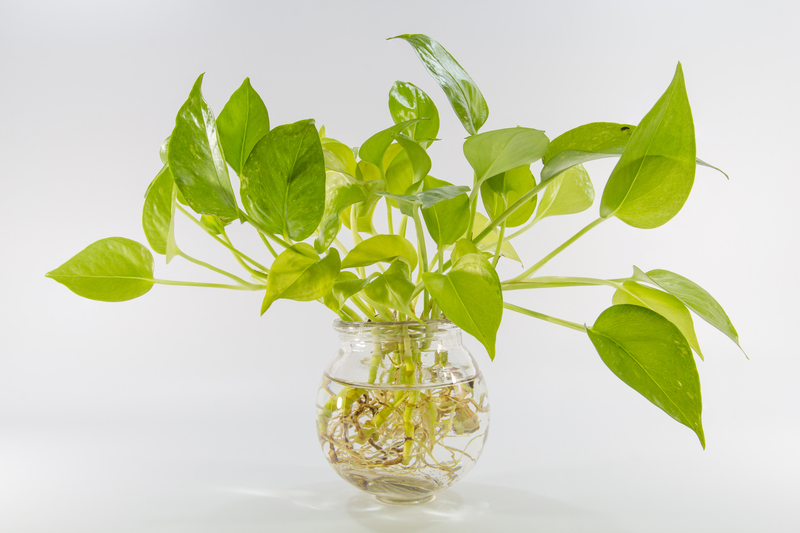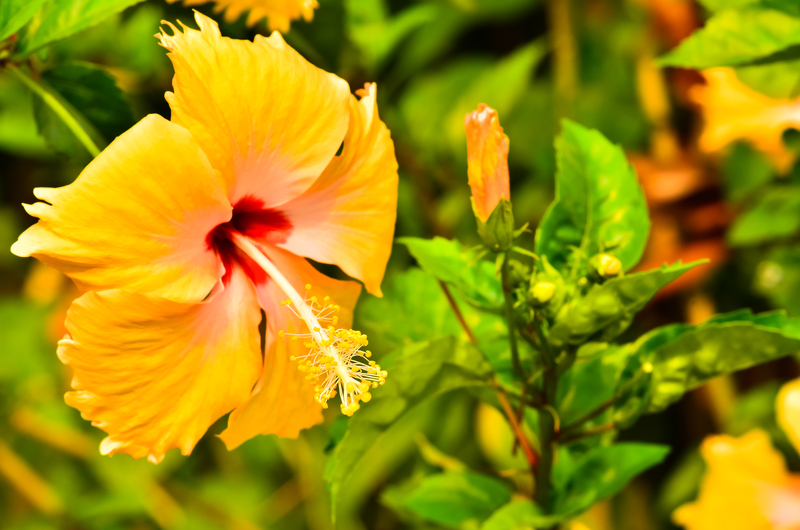Organic Waste Transformed into Soil Gold
Posted on 12/06/2025
Organic Waste Transformed into Soil Gold: The Green Revolution
Unlocking the hidden potential of organic waste is rapidly forging a path toward sustainable agriculture and environmental conservation. With landfills overflowing and soils depleted by chemical treatments, the revolution of organic waste transformed into soil gold offers an innovative, eco-friendly solution. Discover how converting food scraps, yard debris, and other biodegradable matter can create nutrient-rich soil amendments - often lovingly dubbed "black gold" by gardeners and farmers alike.

Understanding Organic Waste and Its Environmental Impact
Organic waste encompasses any material derived from living matter, ranging from food leftovers to fallen leaves and even butchered crop residues. According to the Environmental Protection Agency (EPA), organic waste accounts for a staggering portion of municipal solid waste worldwide. When these materials are discarded in landfills, the lack of oxygen leads to the release of potent greenhouse gases like methane, contributing to climate change and environmental degradation.
- Food scraps from households, restaurants, and institutions
- Yard trimmings: grass clippings, leaves, branches
- Agricultural residues: straw, husks, post-harvest debris
- Wood waste: chips, sawdust, small branches
Transforming these wastes through composting and other biological methods not only reduces landfill pressure but also results in a product that can reinvigorate farmland and home gardens.
Why Is Organic Waste a Burden?
Improperly managed organic waste leads to:
- *Methane emissions* that worsen global warming
- Foul odors and the spread of pests
- Leachate seeping into groundwater, compromising drinking water quality
The Science Behind Turning Organic Waste into Soil Gold
The process of transforming organic waste into nutrient-dense soil centers around controlled biological decomposition. Microbes, fungi, and earthworms break down complex organic molecules into simpler forms, gradually yielding humus--a stable form of carbon essential for healthy soil.
Composting: The Classic Method
Composting is arguably the most popular and accessible way to convert organic materials into rich, dark compost. This process involves:
- A balance between carbon-rich ("browns") and nitrogen-rich ("greens") inputs
- Aeration to provide oxygen for decomposers
- Moisture control for optimal microbial activity
When properly managed, a compost pile can reach temperatures up to 160?F (71?C), hastening the breakdown of waste and eliminating pathogens.
Vermicomposting: Worms at Work
Vermicomposting leverages earthworms (especially the red wiggler species) to accelerate decomposition. The result is vermicast, a nutrient-dense casting packed with beneficial microbes, enzymes, and plant growth-promoting hormones. Vermicompost has been shown to boost plant yields, improve soil structure, and suppress disease.
Advanced Techniques: Bokashi, Anaerobic Digestion, and Biochar
- Bokashi employs special microbial cultures to ferment food waste anaerobically, producing a pre-compost product that decomposes rapidly when added to soil.
- Anaerobic digestion utilizes sealed tanks where organic matter is broken down by bacteria, producing biogas (for energy) and a nutrient-rich digestate that can be used as fertilizer.
- Biochar production involves burning organic waste in low-oxygen environments. The result, biochar, is a stable form of carbon that enhances soil fertility and water retention.
Benefits of Converting Organic Waste into Soil Gold
The widespread adoption of organic waste transformation delivers sweeping benefits from the backyard garden to the global environment:
- Improved Soil Fertility: Compost and related products provide essential nutrients (N-P-K) and trace minerals, reducing dependence on synthetic fertilizers.
- Enhanced Soil Structure: Organic matter boosts soil aeration, moisture retention, and the ability of roots to access water and nutrients.
- Reduced Landfill Waste: Diverting organics from landfills eases the burden on waste management systems and shrinks landfill footprints.
- Climate Change Mitigation: Proper composting curbs methane production and sequesters carbon within the soil.
- Promotion of Soil Microbiology: Compost feeds beneficial microbes that outcompete pathogens and fortify plant health.
- Cost Savings: Municipalities and farms save on fertilizer costs, landfill fees, and energy expenses via waste diversion programs.
Transforming Waste to Soil Gold: Practical Steps for Households and Businesses
Getting started with organic waste recycling is more accessible than you might think. Here's how homeowners, schools, businesses, and even municipalities can join the movement:
At Home: Small Scale Composting Made Simple
- Set up a composting system (pile, bin, or tumbler) in your backyard or balcony.
- Layer food scraps (vegetable peels, fruit skins, coffee grounds) with dry materials (leaves, straw, shredded newspaper).
- Turn the pile weekly, maintain moisture, and avoid adding meat or dairy to prevent odor.
- Within a few months, harvest dark, crumbly compost--your own soil gold.
Community and Urban Solutions
- Community gardens can install large-scale compost bins and share compost among plot holders.
- Many cities now offer curbside organic waste collection programs, diverting thousands of tons of food and yard waste annually.
- Schools and cafeterias can teach composting to students while reducing canteen waste.
- Neighborhood biodigesters can transform waste into both fertilizer and renewable energy.
On the Farm: Circular Agriculture
- Farmers can compost crop residues and manure, returning organic matter and nutrients to the soil.
- Integrated systems, such as vermicomposting beds and rotational grazing, complete the loop from waste to fertility.
- Biochar production on-farm recycles tree prunings and waste husks into long-lasting soil amendments.
Success Stories: Reaping the Rewards of Soil Gold
From California vineyards to African smallholder plots, transforming organic waste into soil gold is revitalizing land and communities. Here are a few inspiring examples:
- San Francisco became the first major U.S. city to mandate composting, diverting more than 600 tons daily and generating compost for local farms.
- India's "Gobardhan Yojana" initiative empowers rural families to use livestock manure and organic waste for biogas and organic fertilizer production.
- Urban farming initiatives in New York and London transform food scraps into ultra-local, organically grown veggies for city dwellers.
Challenges and Innovations on the Path to Soil Gold
While the movement is undeniably powerful, certain challenges remain:
- Lack of awareness and education about effective composting methods
- Limited infrastructure for large-scale collection and processing
- Contamination of organic waste streams with plastics or chemicals
- Odor complaints in densely populated areas
However, new solutions are emerging every year:
- Smart bins with odor filter technology simplify indoor composting
- Mobile composting services collect kitchen scraps right from your doorstep
- IoT sensors monitor industrial compost piles for ideal moisture and temperature automatically
- Advanced screening methods keep plastics and contaminants out of the compost stream
How to Use Soil Gold in Your Garden or Farm
Once you've produced your own organic compost, worm castings, or bokashi amendments, application is easy:
- Mulch garden beds with 1-3 inches of compost to nourish roots and suppress weeds.
- Top-dress lawns and trees annually to build healthier soil and lusher growth.
- Blend vermicompost into potting mixes for seedlings and houseplants.
- Feed orchard trees or vineyard rows with bokashi or digestate for bumper harvests.
Frequently Asked Questions: Organic Waste Transformation
-
Does composting attract pests?
Properly managed compost bins (well covered, balanced, and moist) pose little risk of attracting rodents or insects. Avoiding meat and dairy is key. -
Is compost safe for food crops?
Finished compost, matured for at least 2-3 months and heated to sufficient temperatures, is safe and highly beneficial for food gardens. -
How much time does composting take?
Traditional compost piles take 3-9 months; tumblers and vermicompost may work faster, while bokashi completes in 4-6 weeks.

The Future of Organic Waste: A Circular Soil Economy
Globally, only a small percentage of potential organic waste is transformed into soil gold - but that figure is rising fast, driven by innovation and environmental necessity. As more individuals and organizations adopt composting and related biotechnologies, we move closer to a circular economy in which waste is truly a resource.
- Savvy entrepreneurs are developing apps and systems to connect urban waste sources with local farms in need of compost.
- Researchers are exploring genetically enhanced decomposers - bacteria, fungi, and even insects - for ultra-efficient degradation of tough wastes.
- Governments around the world are setting ambitious "zero waste to landfill" goals, with large cities investing in industrial composting and biodigestion plants.
Create Your Own Soil Gold: Start Today
Every banana peel, coffee filter, or autumn leaf is a potential ingredient in your very own soil gold. Whether you're caring for a single houseplant, a backyard garden, or an entire farm, the journey from waste to wealth starts with a commitment to recycling organic matter. The rewards--lush growth, healthier soil, reduced waste, and a cleaner planet--are within reach.
Take The Green Gold Plunge:
- Learn about local composting programs or start one in your neighborhood.
- Educate children and friends about the magic of turning waste into garden gold.
- Celebrate every harvest grown atop a foundation of black gold!
Organic waste transformed into soil gold is not just a slogan; it's a movement shaping a regenerative, sustainable future from the ground up.
Latest Posts
Innovative Hedge Trimming: Shapes That Impress
Building a Weather-Resistant Garden Oasis
Ultimate Gardening Tools for Nature Enthusiasts

